April and May, the notoriously stressful months, for much of America’s high schoolers, in which prom takes place. A dance so hyped that, in pursuit of planning of the “perfect prom experience,” friendships are strained and societal pressures weigh heavily on boys and girls alike.
April and May, the notoriously stressful months, for much of America’s high schoolers, in which prom takes place. A dance so hyped that, in pursuit of planning of the “perfect prom experience,” friendships are strained and societal pressures weigh heavily on boys and girls alike.
But prom is something of a long-standing tradition in the U.S., an unavoidable part of high school life. In fact, according to The Week, it makes up a nearly $4-billion industry every year. Individual high schoolers spend on average $1,000 on dresses, tickets, dining, and other various fees every single year.
Is one night really worth all the hype and the vastly mounting expenses? Not to mention the significant rise in DUIs and deaths/injuries inflicted under the influence after inevitable post-prom after parties? No, not in its current state at least.
Any which way you look at it, prom has numerous cons that outweigh most of its pros. However, that is not to say I will not be joining the millions upon millions of high school seniors and juniors in on the fun. If anything, I’ll probably have an even better time because I do not expect a life-changing dance and I have not spent thousands of dollars to meet those nonexistent expectations.
It is great to be excited about something; to look forward to a night of dancing with friends, classy tuxedos, and beautiful dresses. I get it, we all want a night to remember, a night that will go down in each of our respective histories, a night that makes us all look back on high school with a sense of fondness and longing and nostalgia. What is not okay is the extent to which we place importance on one night.
And though this “magical night” is thought to somewhat signify our adolescent passage into adulthood, we should place less pressure on the “magic” and more emphasis on safety and responsibility.














